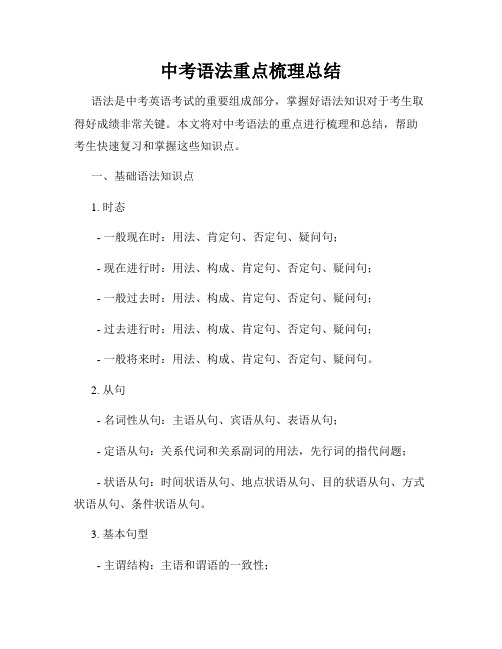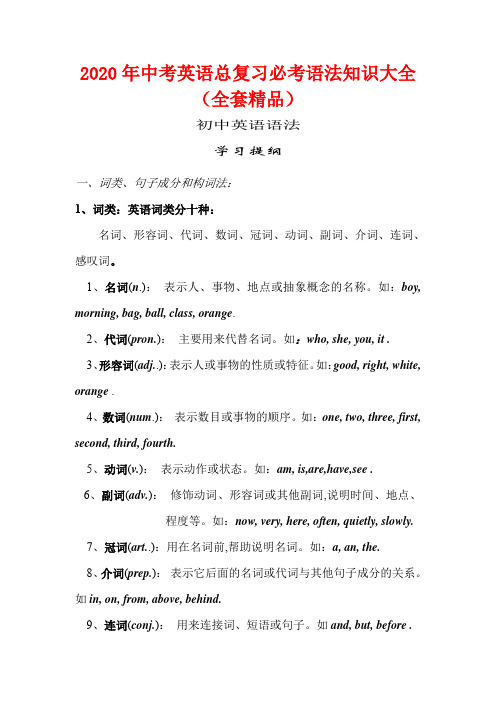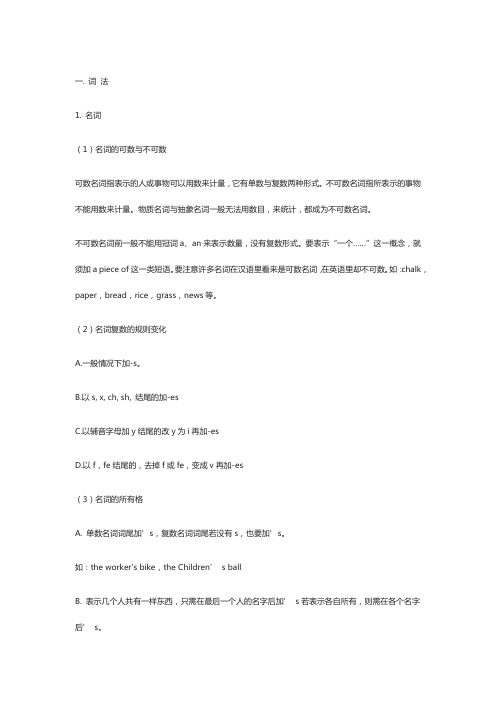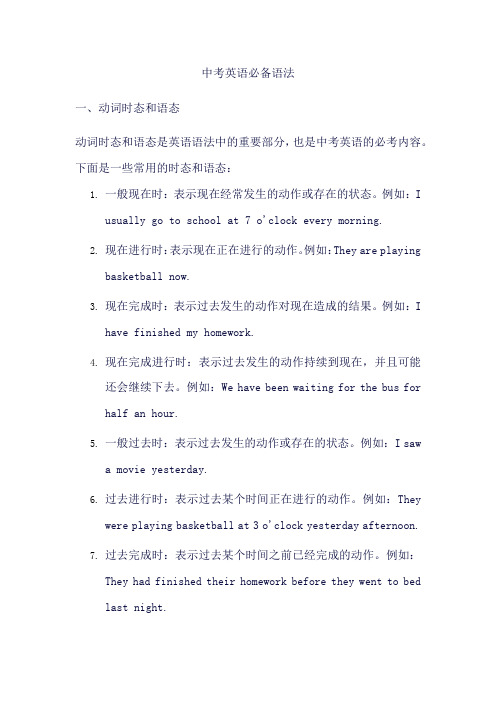2020最新中考英语语法必考知识点汇总
中考语法重点梳理总结

中考语法重点梳理总结语法是中考英语考试的重要组成部分,掌握好语法知识对于考生取得好成绩非常关键。
本文将对中考语法的重点进行梳理和总结,帮助考生快速复习和掌握这些知识点。
一、基础语法知识点1. 时态- 一般现在时:用法、肯定句、否定句、疑问句;- 现在进行时:用法、构成、肯定句、否定句、疑问句;- 一般过去时:用法、构成、肯定句、否定句、疑问句;- 过去进行时:用法、构成、肯定句、否定句、疑问句;- 一般将来时:用法、构成、肯定句、否定句、疑问句。
2. 从句- 名词性从句:主语从句、宾语从句、表语从句;- 定语从句:关系代词和关系副词的用法,先行词的指代问题;- 状语从句:时间状语从句、地点状语从句、目的状语从句、方式状语从句、条件状语从句。
3. 基本句型- 主谓结构:主语和谓语的一致性;- 主谓宾结构:动宾搭配、及物动词和不及物动词; - 主系表结构:系动词的用法、表语的形式。
二、常见错误类型及纠正方法1. 词性错误- 形容词和副词的用法区别;- 名词和动词的转化。
2. 时态错误- 部分考生容易混淆不同时态的用法;- 注意句子的上下文语境,选择正确的时态。
3. 代词错误- 指代不明确,造成语义模糊;- 注意先行词和代词在语法和逻辑上的一致性。
4. 介词错误- 介词搭配的固定搭配用法;- 注意特殊动词和介词的搭配。
三、复合句的连接词1. 并列连接词- and, but, or, so等的用法和区别;- 注意使用上的逻辑连贯和前后句之间的平衡。
2. 引导性连接词- because, if, when, while等的用法;- 注意从句与主句之间的逻辑关系。
3. 状语连接词- before, after, since等的用法;- 理解并正确运用时间、地点和条件等状语从句。
四、易混淆的语法知识点1. 动词时态和语态的区别;2. 定语从句和状语从句的区别;3. 直接引语和间接引语的句式转换。
五、巩固方法与技巧1. 多做语法练习题,掌握各类语法知识的运用;2. 利用语法书籍和教辅材料进行针对性的学习;3. 多听、多读、多写,培养语感和理解能力。
2020年中考英语语法重点纲要

初中英语语法重点汇总Ⅰ. 词法一、名词1、名词的种类❖专有名词❖普通名词✓可数名词个体名词、集体名词✓不可数名词物质名词、抽象名词2、名词的数❖可数名词的数✓单数✓复数➢规则变化●一般情况下词尾-s●以-s、-x、-ch、-sh等结尾的名词词尾-es●以辅音字母-y结尾的词,变y为i,-es●以元音字母-y结尾的词,直接词尾-s●以-f/-fe结尾的词,变f/fe为v,-es●以-o结尾的词,-s或-es➢不规则变化●单词中元音字母发生变化,如man-men,foot,feet●单数复数同形,如sheep-sheep,Chinese-Chinese●复合名词,只变主体名词部分,如boyfriend-boyfriends●其他,如child-children➢特殊情况●只用复数的名词●以-s结尾但并不是复数的名词●集体名词既可以复数,也可以单数●其他❖不可数名词的数✓不可数名词没有复数形式✓有些不可数名词表示具体事物时可数,但意义不同,如chicken,paper3、名词的计量❖可数名词的计量❖不可数名词的计量4、名词所有格❖-’s所有格❖of+名词所有格❖of+-’s 双重所有格❖被名词所有格修饰的名词的省略5、名词在句子中的作用作主语作表语作宾语作宾语补足语作定语作状语作同位语作称呼语二、代词1、人称代词2、物主代词3、反身代词4、相互代词有each other和one another等5、指示代词❖单数:this,that❖复数:these,those6、不定代词❖some和any❖many和much❖both和all❖neither和none❖either、each和every❖another、other(s)和the other(s)✓for another two weeks = for two more weeks ✓some...others...✓one...the other...✓the others = the other +复数❖(a) few和(a) little❖one(s)❖复合不定代词:some-,any-,no-,every-❖复数:these,those7、疑问代词❖指人✓主格:who✓宾格:whom✓所有格:whose❖指物what❖指人或物which8、连接代词who,whom,whose,what,which,whoever,whatever,whichever 9、关系代词who,whom,whose,what,which三、数词1、常见表达法❖日期与时刻✓日期某月某年、某月某日、“月日,年”或“日月,年”✓时刻直接读数表示、用past或to表示❖年龄和年代✓年龄基数词✓年代in the+带有整十的年份的复数或-’s形式❖货币符号+基数词❖编号名词+基数词、the+序数词+名词❖ 小数分数百分数✓ 小数 如three point nine o/zero seven (3.907) ✓ 分数➢ 分子用基数词,分母用序数词,分子大于1时分母序数词后加-s ,如:one third (31),two fifths (52)➢ 分子是2时,常用half ;分子是4时,常用quarter➢ 带分数用“基数词+and+分数”,如:one and two fifths (521)❖ 倍数✓ 倍数+比较级+ than ✓ 倍数+ as +原级+ as ✓ 倍数+ as many/much...+ as...✓ 倍数+ the size/weight/height/length/age...+of... ❖ 约数✓ 大约 about ,nearly ,almost ,some ,around 等 ✓ 超过 over 或more than ✓ 少于 less than ✓ 左右 or so ❖ 算式“+” 用plus 或and ;“-”用minus ;“×”用times 或multiplied by ;“÷”用divided by 2、数词的句法功能❖ 作主语 Twenty of them are from Chonqing. ❖ 作宾语 I like the third best. ❖ 作表语 He is twelve.❖ 作定语 Tom is the tallest of the three boys. ❖ 作状语 Where did you first meet him?❖作同位语We two will help you.3、数词的构成和用法❖基数词✓100以内基数词✓100以上基数词❖序数词✓1~3,4~19✓20~90整十位数✓21以上✓一百、一千、一百万四、介词1、介词的分类简单介词、合成介词、双重介词、短语介词2、介词的位置常规位置、其他位置3、介词短语❖构成介+名,介+代,介+数,介+动名,介+疑问词+不定式,介+从句❖作用作定语、作状语、作表语、作宾语补足语4、介词固定搭配介词与名词、介词与动词、介词与形容词、介词与副词、介词与过去分词5、常见介词用法❖表示时间✓at,in,on✓since,for✓after,in✓by,until/til✓before,after✓from✓during❖表示地点、方位✓at,in,on,to✓on,over,above,under,below✓beside,by,near,nearby,next to,around ✓inside,outside✓into,onto,out of,off✓across,through,past,over,along,down ❖表示方式手段工具✓in,on,by✓in,by,with❖其他✓on,about✓except,except for,besides ✓between,among✓of✓like ✓with✓without ✓for✓as✓against五、冠词1、冠词的用法❖定冠词✓特指的✓谈话双方都知道的✓上文提到的✓独一无二的❖不定冠词✓一类中的任意一个✓第一次谈到✓一类人或物✓数量“一”✓每一,相当于every❖不用冠词✓已有定语✓不可数或复数表一类✓三餐、球类、学科2、冠词的位置❖定冠词❖不定冠词3、有无冠词的区别❖go to school 去上学/ go to the school 到学校去(不一定是学生)❖on earth 究竟/ on the earth 在地球上❖next year 明年/ the next year 第二年❖at table 在吃饭/ at the table 在桌子旁边❖by sea 乘船/ by the sea 在海边❖in bed(睡、病、躺)在床上/ in the bed (某物)在床上❖in class 在上课/ in the class 在班上❖in front of 在(……外部的)前面/ in the front of 在(……内部的)前面六、连词1、按形式简单连词、关联连词、短语连词2、按功能❖并列连词✓表并列and,both...and...,neither...nor...,not only...but also...,as well as✓表转折but,while,yet✓表选择either...or...,or✓表因果so,for❖从属连词✓引导名词性从句主语从句、宾语从句、表语从句、同位语从句✓引导状语从句时间状语、条件状语、原因状语、目的状语、让步状语、结果状语、地点状语、比较状语、方式状语七、副词1、副词的种类时间、地点、频度、方式、程度、疑问、关系、连接、其他2、副词的构成形容词+-ly,与形容词同形3、副词的句法功能作状语、作定语、作表语、作补足语4、副词在句中的位置时间地点、频度、方式、程度、疑问、关系和连接、地点、修饰句子5、副词的比较等级❖构成✓规则✓不规则❖用法6、副词与形容词比较作用不同、句中位置不同、谓语动词7、常见易混副词辨析❖too,either,also,as well ❖already,yet❖ago,before❖hard,hardly❖late,lately❖very,much,very much ❖too,very,quite❖just,just now❖such,so ❖nearly,almost❖fast,quickly,soon❖too much,much too❖how long,how often,how soon ❖farther,further❖sometimes,sometime❖no,not❖maybe,perhaps❖high,highly八、形容词1、形容词的种类性质形容词、叙述形容词2、形容词的构成❖本身就是形容词❖名词+后缀-y,-ful,-less,-ern,-ly,-n❖复合形容词数词+名词、形容词+名词-ed、形容词+动词-ing、名词+动词-ed、副词+动词-ed3、形容词的句法功能作定语、作表语、作宾语补足语、作状语、作主语或宾语4、形容词的位置❖前置或后置❖排序限定词+数量词+描绘性形容词(大小长短形状新旧颜色)+出处+材料+类别用途+名词5、形容词的比较等级❖构成✓规则变化➢long-longer-longest➢nice-nicer-nicest➢big-bigger-biggest➢easy-easier-easiest➢beautiful-more beautiful-most beautiful✓不规则变化➢good/well-better-best➢bad/ill-worse-worst➢little-less-least➢many/much-more-most➢far-farther/further-farthest/furthest➢old-older/elder-oldest/eldest❖用法✓同级比较、同级比较特殊用法✓比较级、比较级特殊用法✓最高级、最高级特殊用法6、含有形容词的固定短语和句型❖固定短语at,about,for,in,of,to,with ❖常用句子✓It’s + adj. + of sb. to do sth.✓It’s + adj + for sb. to do sth.✓sb. be + adj. + to do sth.7、常见易混形容词辨析❖good,fine,nice,well ❖alone,lonely❖interesting,interested ❖exciting,excited ❖ill,sick❖true,real❖huge,large,big,great ❖pleased,pleasant❖elder,older❖farther,further九、动词1、动词的基本形式动词原形、一般现在时第三人称单数、现在分词、过去分词、过去式2、动词的种类❖行为动词及物动词、不及物动词❖连系动词后跟表语❖助动词无意义,语法需要。
2020年中考英语总复习必考语法知识大全(全套精品)

2020年中考英语总复习必考语法知识大全(全套精品)初中英语语法学习提纲一、词类、句子成分和构词法:1、词类:英语词类分十种:名词、形容词、代词、数词、冠词、动词、副词、介词、连词、感叹词。
1、名词(n.):表示人、事物、地点或抽象概念的名称。
如:boy, morning, bag, ball, class, orange.2、代词(pron.):主要用来代替名词。
如:who, she, you, it .3、形容词(adj..):表示人或事物的性质或特征。
如:good, right, white, orange .4、数词(num.):表示数目或事物的顺序。
如:one, two, three, first, second, third, fourth.5、动词(v.):表示动作或状态。
如:am, is,are,have,see .6、副词(adv.):修饰动词、形容词或其他副词,说明时间、地点、程度等。
如:now, very, here, often, quietly, slowly.7、冠词(art..):用在名词前,帮助说明名词。
如:a, an, the.8、介词(prep.):表示它后面的名词或代词与其他句子成分的关系。
如in, on, from, above, behind.9、连词(conj.):用来连接词、短语或句子。
如and, but, before .10、感叹词(interj..)表示喜、怒、哀、乐等感情。
如:oh, well, hi, hello.2、句子成分:英语句子成分分为七种:主语、谓语、宾语、定语、状语、表语、宾语补足语。
1、主语是句子所要说的人或事物,回答是“谁”或者“什么”。
通常用名词或代词担任。
如:I’m Miss Green.(我是格林小姐) 2、谓语动词说明主语的动作或状态,回答“做(什么)”。
主要由动词担任。
如:Jack cleans the room every day. (杰克每天打扫房间)3、表语在系动词之后,说明主语的身份或特征,回答是“什么”或者“怎么样”。
2020年中考英语语法重点复习讲义:六、形容词、副词

六、形容词、副词:1、形容词:用来说明或修饰名词、代词的词称为形容词。
1、形容词的句法作用:作句子中名词的定语、句子的表语以及宾语补足语。
2、形容词在句子中的位置:⑴作定语时放在名词的前面,且音节少的词放在音节多的词之前。
如:a big yellow wooden wheel(一个黄色的大木轮)⑵作表语时放在连系动词之后。
如:The price soundsreasonable.(这个价格听起来算是合理)⑶作宾语补足语时放在宾语之后。
如:We must try our best to keepour environment clean.(我们必须尽力保持我们的环境清洁)⑷后置的情况:①修饰复合不定代词时放在代词之后。
如:Something serious hashappened to him.(他发生了严重的事故)②与表示“长、宽、高、重、老、远离”的词连用时形容词后置。
如:He’s 1.8 metres tall.(他身高1.8米。
)The moon is about380,000 kilometres away from the earth.(月球离地38万公里)3、有关形容词的用法辨析:⑴whole与all:记住两个词序:①the whole + 名词;②all (of) the+ 名词。
如:He was busy the whole morning.(整个早晨他都很忙)/ He can remember all the words he learns.(他能记住学过的所有单词)⑵tall与high, short与low:指人的个子时用tall与short;指其他事物时一般用high与low。
如:He’s very tall/short.(他个子高/矮) / Tall trees are standing on both sides of that avenue.(大道的两侧有高大的树木) / A few people live on high mountains.(少量的人住在高山上)⑶real与true:real一般指东西的真假,译为“真的”;而true则指事情或消息的可靠性,译为“真实的”。
2020年中考英语必考语法点

一. 词法1. 名词(1)名词的可数与不可数可数名词指表示的人或事物可以用数来计量,它有单数与复数两种形式。
不可数名词指所表示的事物不能用数来计量。
物质名词与抽象名词一般无法用数目,来统计,都成为不可数名词。
不可数名词前一般不能用冠词a、an来表示数量,没有复数形式。
要表示“一个……”这一概念,就须加a piece of这一类短语。
要注意许多名词在汉语里看来是可数名词,在英语里却不可数。
如:chalk,paper,bread,rice,grass,news等。
(2)名词复数的规则变化A.一般情况下加-s。
B.以s, x, ch, sh, 结尾的加-esC.以辅音字母加y结尾的改y为i再加-esD.以f,fe结尾的,去掉f或fe,变成v再加-es(3)名词的所有格A. 单数名词词尾加’s,复数名词词尾若没有s,也要加’s。
如:the worker's bike,the Children’s ballB. 表示几个人共有一样东西,只需在最后一个人的名字后加’s若表示各自所有,则需在各个名字后’s。
如:This is Lucy and Licy’s room.These are Kate's and jack’s rooms.C. 如果是通过在词尾加—s构成的复数形式的名词,只加’。
如:the students’books,the girls’blouses(另外:名词+of+名词名词是有生命的,我们就用’s结构来表示所有关系。
如果名词所表示的事物是无生命的,我们就要用名词+of+名词的结构来表示所有关系。
)2. 代词人称代词,物主代词,反身代词,指示代词,不定代词(1)人称代词第一人称单数I me my mine myself复数we us our ours ourselves第二人称单数you you your yours yourself复数you you your yours yourselves第三人称单数he him his his himselfshe her her hers herselfit it its its itself复数they them their theirs themselves(2)物主代词物主代词的用法:形容词性物主代词后面一定要跟上一个名词;名词性物主代词可作主语、表语、宾语。
2020中考英语英语语法总复习代词.doc

2020 中考英语英语语法总复习代词2020 中考英语英语语法总复习代词( 一 )知识概要英语中代词可以分为人称代词、物主代词、反身代词、指示代词、疑问代词、不定代词。
人称代词主要有主格和宾格之别。
请看下表人称我你他她它我你他主格 i you he she it we you they格 me you him her it us you them物主代分形容性物主代和名性物主代两种。
看下表人称我的你的他的她的它的我的你的他的形容性my your his her its ours your they名性 mine yours his hers its ours yours theirs反身代可下表人称我你他她它我你他反身代myself yourself himself herself itself ourselves yourself themselves指示代主要有this, that, these, those疑代有: who, whom whose, what, which,有疑副when, how, where, why。
不定代在初中本中主要有some, any ,many, much, each, neither, other, another, all, both, one, none, either ⋯( 二 )正辨析[] Tom's mother is taller than my.[正] Tom's mother is taller than mine.[析]形容性物主代可以作定,也就是它可以作形容,如:my book ,而句的意思是:姆的比我的高。
比的象是my mother, 也就是mine。
[] Wehave a lot of homework to do today. So we need two or three hours to finish them.[正] Wehave a lot of homework to do today. So we need two or threehours to finishit.[析]在 用代 , 要注意人称,格与数的一致性。
中考英语必备语法

中考英语必备语法一、动词时态和语态动词时态和语态是英语语法中的重要部分,也是中考英语的必考内容。
下面是一些常用的时态和语态:1.一般现在时:表示现在经常发生的动作或存在的状态。
例如:Iusually go to school at 7 o'clock every morning.2.现在进行时:表示现在正在进行的动作。
例如:They are playingbasketball now.3.现在完成时:表示过去发生的动作对现在造成的结果。
例如:Ihave finished my homework.4.现在完成进行时:表示过去发生的动作持续到现在,并且可能还会继续下去。
例如:We have been waiting for the bus forhalf an hour.5.一般过去时:表示过去发生的动作或存在的状态。
例如:I sawa movie yesterday.6.过去进行时:表示过去某个时间正在进行的动作。
例如:Theywere playing basketball at 3 o'clock yesterday afternoon.7.过去完成时:表示过去某个时间之前已经完成的动作。
例如:They had finished their homework before they went to bedlast night.8.过去完成进行时:表示过去某个时间之前一直在进行的动作,并且该动作在过去的某个时间还在进行。
例如:We had been waiting for the bus for an hour before we finally got on board.二、情态动词和助动词情态动词和助动词是英语语法中的重要部分,也是中考英语的必考内容。
下面是一些常用的情态动词和助动词:1.can/could:表示能力或可能性。
例如:Can you speakEnglish?/I could go to the movies with you tonight if you want.2.may/might:表示可能性或请求许可。
2020最新中考英语知识点归纳

2020 最新中考英语知识点归纳一、必背知识点总结:1 (see 、 hear 、notice 、find 、feel 、listen to 、 look at ( 感官动词 )+do eg:I like watching monkeys jump2 (比较级and 比较级)表示越来越怎么样3 a piece of cake =easy 小菜一碟(容易)4 agree with sb赞成某人5 all kinds of各种各样 a kind of一样6 all over the world = the whole world整个世界7 along with 同一道,伴随eg : I will go along with you我将和你一起去 the students planted trees along with their teachers 学生同老师们一起种树8 As soon as 一怎么样就怎么样9 as you can see 你是知道的10 ask for求助向要(直接接想要的东西)11 ask sb for sth向某人什么12 ask sb to do sth 询问某人某事ask sb not to do叫某人不要做某事13 at the age of在岁时14 at the beginning of的起初;的开始15 at the end of + 地点 /+ 时间最后;尽头;末尾16 at this time of year在每年的这个时候17 be /feel confident of sth /that clause +从句感觉/对什么有信心,自信18 be + doing 表: 1现在进行时19 be able to (+ v原) = can (+ v2 将来时原)能够21 be afraid to do (of sth恐惧,害怕22 be allowed to do被允许做什么23 be angry with sb生某人的气24 be angry with(at) sb for doing sth为什么而生某人的气eg : She is as tall as me她和我一样高25 be as 原级as 和什么一样26 be ashamed to27 be away from远离28 be away from从离开29 be bad for对什么有害30 be born出生于31 be busy doing sth忙于做什么事be busy with sth忙于32 be careful当心;小心33 be different from和什么不一样34 be famous for以著名35 be friendly to sb对某人友好36 be from = come from来自37 be full of装满的be filled with充满eg: the glass is full of water the glass is filled with water38 be glad+to+do/ 从句39 be going to + v( 原)将来时40 be good at(+doing) = do well in在某方面善长,善于41 be good for对什么有好处42 be happy to do很高兴做某事43 be helpful to sb对某人有好处44 be in good health身体健康45 be in trouble处于困难中46 be interested in对某方面感兴趣47 be late for = come late to迟到eg: Be late for class 上课迟到48 be like像eg : I'm like my mother49 be mad at 生某人的气50 be made from由制成(制成以后看不见原材料)51 be made of 由制成 (制成以后还看得见原材料)52 be not sure表不确定53 be on a visit to参观54 be popular with sb受某人欢迎55 be quiet安静is short for陶俊杰56 be short for表**的缩写eg: 陶57 be sick in bed生病在床58 be sorry to do sth be sorry for sb eg : I am sorry for you59 be sorry to hear that60 be sorry to trouble sb61 be strict in doing sth严于做某事62 be strict with sb 对某人要求严格63 be strict with sb in sth某方面对某人严格64 be supposed to do被要求干什么65 be sure表确定66 be sure of doing sth对做某事有信心67 be sure of sth对做某事有信心68 be sure that sth对做某事有信心69 be sure to do sth 一定会做某事 We are sure to learn English well我们一定能学好英语70 be terrified of +名/ 动 doing害怕71 be terrified to do sth害怕做某事72 be the same as和什么一样73 be used to doing sth习惯做某事My father is used to getting up early我爸爸习惯早74 be worth doing值得做什么75 be(feel) afraid to do sth害怕做某事be afraid of sth害怕某物be afraid that 丛句76 because+句子because of +短语eg : He was late because he had a headache He was late because of his headache77 begin to do = start to do开始做某事start with=begin with以什么开始什么78 between and 两者之间79 borrow sth from sb向借lend sth to sb ( lend sb sth 借给什么东西80 both = the same(as) = not different(from)表相同81 bother打扰bother sb to do stheg : I'm sorry to bother you ,but can you tell me to way to the station我十分道歉打扰你,但是你能告诉我怎么去车站82 by the end of到为止83 call sb sth eg : We call him old wang85 catch up with sb赶上某人86 chat with sb和某人闲谈take sb to +地点带某人去某地87 come in进88 come over to89 come up with 过来提出eg: Can you come up with a good idea你能想出一个好办法吗?90 communicate with sb和某人交流91 consider + doing考虑做什么eg : Why not consider going to lu zhou为什么不考虑去泸州?92 dance to随着跳舞93 decide to do sth决定做某事94 do a survey of做某方面的调查95 do better in在方面做得更好96 do wrong做错97Don't forget to do sth不要忘了做某事98Don't mind +doing /从句 / 名词不要介意99 each +名(单)每一个eg : Each student has many books 每一个学生都有一些书 100 end up +doing101 enjoy +doing 喜欢102 escape from从逃跑103 expect to do sth期待做某事104 fall down摔下来fall off从哪摔下来105 fall in love with sb /sth爱上什么106 far from离某地远107 find +it +adj +to do发现做某事怎么样108 find sb/sth +adj发现什么怎么样109 finish完成+doing(名词)110 fit to sb = be fit for sb适合某人eg : I find the book interesting111 forget to do 112 from to没有做而忘了从某某到某某forget doing做了而又忘了eg: From me for her113 get /have sth down 做完,被(别人)做 eg: I have my hair cut 我理了发 ( 头发被剪了)Tom got his bad tooth pulled out汤母把他的坏牙拔掉了(被牙医拔掉了)114 get a part-time job= find a part-time job115 get along well with sb = get on well with sb与某人相处得好116 get along with sb = get on with sb与某人相处117 get ready for = be ready for为什么而准备118 get sb in to trouble给某人带来麻烦120 get from 从某处得到某物121 give a talk做报告122 give sth to sb give sb sth给某人某物123 go fish钓鱼 go swimming游泳124 go on to do去做下一件事go on doing继续做这件事125 go out away from 远离 go out of从离.开126 go to school上学(用于专业的) go to the school 去学校(不一定是上学)127 good way to好方法128 hate to do 讨厌没做过的事hate doing讨厌做过的事129 have a party for sb 举办谁的晚会130 have a talk听报告谈一谈131 have been doing 现在完成进行时132 have been to地方()去过某过地方have gone to (地方)去了某地还没回来133 have fun +doing 玩得高兴134 have sth to do有什么事要做135 have to do sth必须做某事136 have trouble (problem) (in) doing sth做什么事情有麻烦137 have time +doing138 have (时间 ) off 放假139 hear sb +do/doing听见某人做某事 / 正在做某事140 help a lot 很大用处141 help sb with sth \one's sth帮助某人某事(某方面)help sb (to) do sth 帮助某人做某事142 hope to do sth希望做某事143 How about(+doing) = What about(+doing)144 how do you like = what do you think of你对什么的看法145 if :是否=wethereg: I don't know if (wether) I should go to the party 我不知道我是否应该去参加晚会He don't know if (wether) we will arrive on time tomorrow morning他不知道我们明天早上是否能准时到达146if : 如果,假如(全部接一般时态)+条件语态从句eg: I'll go to LuZhou if it does't rain假如明天不下雨,我就去泸州If they change the plan they will let me know 假如他们要改变计划,他们会让我知道的I'll go to England ,if I have enough money next year如果我明年由足够的钱,我就要去英国147 in one's opinion = sb think某人认为148 in some ways在某些方面149 in the end = finally(adv)最后150 in the north of什么在什么的北方(north北sowth南west西east 东)151 in the sun在太阳下152 increase增加eg : They've increased the prece of petrol by 3%他们把石油价增加了3%153 instead of + (名)代替eg: I'd like an apple instead of a pear我想要苹果,而不要梨子154 introduce sb to sb介绍某人给某人introduce oneself 自我介绍155 invite sb to do sth邀请某人做某事156It takes sb sometime to do sth 做某人花掉某人多少时间eg : It took me 5 minutes to do my homework It takes me half an hour to cook157It's +adj +for sb to do sth 对某人来说做某事怎么样158It's +adj +to do 做某事怎么样159It's +adj for sb 对于某人来说怎么样It's +adj of sb 对某人来说太怎么样160It's +adj(for sb) to do (对某人来说)做某事怎么样 It's +adj of sb to do sth 对某人来说做某事太怎么样eg : It's nice of you to help me with my English161 It's a good idea for sb to do sth对来说是个好主意162 It's important to sb对某人来说很重要 eg: It's important to me163 It's time to do sth It's time for sth到了该去做某事的时间eg : It's time to have class It's time for class 该去上课了164 join = take part in 参加165 just now刚才166 keep +sb /sth +adj / 介词短语让什么保持什么样?167 keep out不让进入168 keep sb adj让保持keep healthy保持健康169 key to + 名词表示:某物的钥匙或某题的答案170 key to anser to可以是key答题或钥匙171 laugh at取笑172 learn by oneslfe 自学173 learn from sb向某人学习174 learn to do sth 学做某事175 let sb do sth让某人做某事176 Let sb down让某人失望 eg : We shouldn't let our farents down我们不应该让我们的父母失望177 live from : 离某地远178 live in + 大地方 /at + 小地方居住在某地179 look after = take care of 照顾照看180 lose one's way 谁迷路181 make a decision to do sth 决定做某事182 make friends with sb和谁成为朋友 eg : I want to make friends with you183 make it early把时间定的早一点184 make on exhibition of oneself让某人出洋相185 make sb /n +n 使什么成为什么 eg : I made her my step moller I made you my wife186 make sb /sth +adj使某人(某物)怎么样eg : You must made your bed clean187 make sb /sth adj 188 make sb do sth使某人 / 某物怎么样让某人做某事189 make up be made up of ( 被动语态)由组成190 make difference to191 mind sb to do mind one's doing介意做什么192 most + 名 most of +代193 much too + 形容词194 must be一定195need +名词196need sb do sth 需要某人做某事197 need to do ( 实义动词)need do (情态动词)198 no /neithr of hate to do no /neithr of hate doing199 no +名词200 not anymore = no more再也不eg: He didn't cry any more201 not形( 、副) at all eg: He's not tall at all she doesn't junp far at all202 not at all一点都不203 not either表否定,也不 eg : I don't japanse either I don't have sister, either 我也没有姐姐204 not until直到才205 offer / provide sb with sth206 offer sb sth ( offer sth to sb water to you我给你提供水给某人提供提供什么东西给某人eg : I offer you water (I offer207 on one's way to在谁去那的路上208 on the one hand一方面on the other hand另一方面209 on the phone = over the phone用电话交谈210 on time准时in time及时211 one day=some day=someday一天,有一天212one of +可数名词的复数形式213one to another 一个到另一个214 over and over agin一遍又一遍的eg : He cleaned the floor over and over agin 215 part-time job兼职工作fall-time job全职工作216 pay for付钱pay the bill开钱,付钱217 please +do218 please help yourself219 pleased with sb220 pool into = pore into221 practice +doing练习做某事222 prefer sth to sth相对更喜欢eg : I prefer physics to chemisty 在物理和化学中,我更喜欢物理prefer sb not to do sth 223 pretend to do sth更愿意eg: I prefer her not to come装着去做什么pretend that从句我不喜欢她不来eg : The two cheats pretended to be working very hard这两个骗子装着努力工作224 rather than宁可也不eg : I would rather be a doctor than a teacher我愿肯当医生,也不当老师225 regard as把当作I regard you as my friend 我把你当作我的朋友226 remid sb about sth提醒某人什么事remid sb to do sth提醒某人做某事eg : he remids me about cooking (he remids me to cook他提醒我做饭227 remid sb of sth使某人想起什么the words that (which) the teacher talke to remind me of my mother228 return sth to sb还什么东西给某人229 say to oneself对自己说230 say to sb 对某人说231 sb spend somemoney on sth花了多少钱在某事上232 sb spend sometime with sb花了多少时间陪谁233 sb spend sometime(in) doing sth花了多少时间做某事234 sb with sb +is sb and sb +are235 see sb do 看见某人做过某事see sb doing 看见某人正在做某事236 seem to do/be +adj 显得怎么样 eg : You seem to be tired You seem to behappy237 send +sb sth 送给某人某物238 send to把什么寄到哪里去?239 shock 使震惊 eg : Oh , It's only you ! You give me a shock 啊,是你呀!吓我一跳240 show sb sth向某人展示某物241 show sb sth = show sth to sb拿什么东西给某人看242 show sth to sb向某人展示某物243 some others 一些另一些244 start with从开始begin with 从开始245 stay away from远离eg : We're told to stay away from the animals whe visiting the zoo 当我们参观 zoo 时,我们要远离动物246 stop doing停下正在做的事247 stop sb from doing sth阻止某人做某事248 stop sb(from) doing阻止某人做某事249 stop to do停下正在做的事去做下一件事250 such +名这样,这种251 suit sb适合某人252 surprise sb使某人惊奇to one's surprise令某人惊奇253 take classes上课254 take sb to 把某人带去 eg : I take you to the hospital255 take walks = take a walk = go for a walk 散步256 ① talk to对谁说②talk with和谁说③talk of 谈到④talk about谈论关于257 talk with sb和某人说话258 teach sb sth教某人做某事259 tell sb do sth告诉某人做某事261 tell sb sth 告诉某人某事tell sb that丛句 tell sb not to do sth262 tell sb〔 not 〕to do sth 告诉某人做什么263 tell from 区别264 thank you for +doing265 the same +名词 (doing)+as266 the same 名 () as as(adj adv)相同 as267 the way to do sth = the way of doing st 做某方面的方法the way to + 地方去哪的路e g :Do you know the way to learn English Do you know the way oflearning English268 the way to(地点)到哪的270 transalte into把什么翻译成什么eg : Trasalte English into chinese271 travel with sb和某人去旅游272 try one's best to do sth 尽某人最大的努力去做某事eg: I will try my best to learn English well273 try to do sth想干什么,但没成功 try doing sth想干什么,已经做过了274 try 试衣服have a try 试一下275 turn down开小←→ turn up 开大276 turn off 关上←→ turn on 打开 open拆开277 upside down倒着278 visit to参观某个地方279 wait for sb等某人【比较 since 和 for】Since 用来说明动作起始时间, for用来说明动作延续时间长度。
2020年中考英语:语法专项(五) 介词和介词短语

午夜前
at dusk 在黄昏
at night 在晚上
介词
用法
示例
表示不迟于某一时 by next Monday 下周一之前 by 刻或某一日期之前 by this afternoon 今天下午之前
by now 到现在
from 8:00 a.m. to 5 p.m.从早上八点到
表示时间范围,通常
下午五点
介词
用法
示例
表示一段时间,用于 in June 在六月
年、月、四季、世纪或 in the twenty-first century 在二十一世纪 in 泛指一天的上午、下 in winter 在冬天
午、晚上前
in the morning 在早上
用于具体的时间点前 at 7:00 在七点
at 或黎明、正午、黄昏、 at noon 在正午
weeks.两周后他从北京回来了。
before 表示“在……之前” Wash hands before dinner.饭前要洗手。
3.since 与 for 辨析
介词
用法
示例
since 多与时间点连用,意为 His father has taught in this
“自……以来”,表示从过去 school since 1985.他的父亲 since 某时刻直到现在,主句通常用 从 1985 年起就在这所学校
【易混易错辨析】
1.方位介词 in,on 与 to 辨析
介词
用法
示例
in 表示某一小地点在另一 Shanghai is in the east of
in 大地点之内
China.上海位于中国的东部。
on
on 表示两个地点相互接壤
2020年中考英语重点知识归纳

2020年中考英语重点知识归纳2020年中考英语重点知识归纳以下是中考英语的重点知识:1.使用“as …as…”结构:你和XXX是一样好的孩子。
You’re as good a boy as Tom.2.使用“too …to”和“so …that sb。
can’t …”句型转换:前者为简单句,主语只有一个,而后者为复合句,主语有两个,试比较:The man was too angry to be able to speak.The man was so angry that he XXX.He is too young to get married.He is not old enough to get married.The book is too difficult for me to read.The book is not easy enough for me to read.3.形容词原级表示比较级含义:John is not as stupid as XXX.John is less stupid than XXX.XXX cleverer than XXX.4.使用比较级表示最高级:John is taller than any other boy in the class.John is the tallest boy in the class.5.使用“the more … the more …”表示“越……越……”:The more books you read。
the wider your knowledge is.The more food you eat。
the fatter you are.More and more students are realizing the importance of a foreign language.XXX.中考考点—词组:1.“after”和“in”这两个介词都可以表示“……(时间)以后”的意思。
2020年中考英语语法知识总复习(推荐)

2020年中考英语语法知识总复习(名师精讲必考语法知识点,合计47页,值得下载背诵)一、名词考点集汇I.名词的种类:专有名词普通名词国名/地名/人名/团体机构名称[来源可数名词不可数名词个体名词集体名词抽象名词物质名词II. 名词的数:1. 规则名词的复数形式:名词的复数形式,一般在单数形式后面加-s或-es。
现将构成方法与读音规则列表如下:规则例词1一般情况在词尾加-smap—maps, sea—seas, girl—girls,day—days2以s, x, ch, sh结尾的名词后加-es class—classes, box—boxes, watch—watches,dish—dishes3以-f或-fe结尾的词变-f和-fe为v再加-esleaf—leaves, thief—thieves, knife—knives,wife—wives, half—halves加-s chief—chiefs, proof—proofs, roof—roofs4以辅音字母加y结尾的名词, 变y为i加-es party—parties, family—families, story—stories, city—cities5以元音字母加y结尾的名词, 或专有名词以y结尾的加-s toy—toys, boy—boys, day—days, ray—rays,Henry—Henrys6以辅音字母加-o结尾的名词一般加-esNegro—Negroes, hero—heroes,potato—potatoes, tomato—tomatoes不少外来词加-spiano—pianos, photo—photos, auto—autos,kilo—kilos, solo—solos 两者皆可zero—zeros/zeroes, volcano—volcanoes /volcanos7以元音字母加-o结尾的名词加-sradio—radios, bamboo—bamboos,zoo—zoos8以-th结尾的名词加-struth—truths, mouth—mouths,month—months, path—paths 2. 不规则名词复数:英语里有些名词的复数形式是不规则的,现归纳如下:规则例词1改变名词中的元音字母或其他形式man—men, woman—women, foot—feet, goose—geese, mouse—mice2单复数相同sheep, deer, means, works, fish, yuan, jin, 3只有复数形式trousers, clothes, thanks, goods, glasses 4一些集体名词总是用作复数people, police5部分集体名词既可以作单数(整体)也可以作复数(成员)class, family, crowd, couple, group, government, population, team, public, party6复数形式表示特别含义customs (海关), times (时代), spirits (情绪), drinks (饮料), sands (沙滩), papers (文件报纸), looks (外表), brains (头脑智力), greens(青菜)7表示“某国人”加-sAmericans, Australians, Germans, Greeks,Swedes, Europeans单复数同形Swiss, Portuguese, Chinese, Japanese 以-man或-woman结尾的改为-men,-womenEnglish men, Frenchwomen8合成名词将主体名词变为复数sons-in-law, lookers-on, passers-by,story-tellers, boy friends无主体名词时将最后一部分变为复数grown-ups, housewives, stopwatches 将两部分变为复数women singers, men servantsIII. 名词的所有格:名词在句中表示所有关系的语法形式叫做名词所有格。
2020年中考英语语法重点复习讲义:十、简单句

十、简单句1、简单句的特点:简单句通常只由一个主语(或并列主语)和一个谓语(或并列谓语)构成。
2、简单句的种类:简单句一般分为陈述句、疑问句、感叹句和祈使句四种。
3、陈述句:用来说明一个事实的句子叫陈述句。
它有肯定式和否定式两种形式。
▲陈述句的肯定式:He is a middle school student.(他是个中学生)/ I have a hammer in my hand.(我手上有把锤子)/ She teaches us geography.(她教我们地理)/ The new play was good enough and everybody enjoyed it.(新的话剧非常好大家都喜欢)▲陈述句的否定式:1)谓语动词如果是to be 、助动词、情态动词时,在它们的后面加“not”。
如:My brother is not a teacher.(我的弟弟不是教师)/ He does not have a cousin.(他没有堂兄弟)/ I will not go there tomorrow.(明天我不去那儿)/ My mother is not cooking a meal in the kitchen.(我母亲现在不在厨房里做饭)/ You must not make such mistakes again.(你不该再犯类似错误了) / We haven’t discussed the question yet(我们还没有讨论那个问题呢).2)谓语动词如果没有上述词语而是其他动词时,须在它的前面加do not(don’t).如:I don’t know anything about it.(此事我一无所知)/ Li Ming does not feed pigs in the countryside.(李明不在农村养猪)/ We didn’t expect to meet her right here.(我们没指望着在这里见到她)/We didn’t have a meeting yesterday afternoon.(昨天下午我们没有开会)3)如果“have”作“有”讲,也可以在它后面加not构成否定式,其形式与have got的否定式相同。
2020年中考英语总复习初中英语语法大全汇编(精华版)

2020年中考英语总复习初中英语语法大全汇编一、词类、句子成分和构词法:1、词类:英语词类分十种:名词、形容词、代词、数词、冠词、动词、副词、介词、连词、感叹词。
1、名词(n.):表示人、事物、地点或抽象概念的名称。
如:boy, morning, bag, ball, class, orange.2、代词(pron.):主要用来代替名词。
如:who, she, you, it .3、形容词(adj..):表示人或事物的性质或特征。
如:good, right, white, orange .4、数词(num.):表示数目或事物的顺序。
如:one, two, three, first, second, third, fourth.5、动词(v.):表示动作或状态。
如:am, is,are,have,see .6、副词(adv.):修饰动词、形容词或其他副词,说明时间、地点、程度等。
如:now, very, here, often, quietly,slowly.7、冠词(art..):用在名词前,帮助说明名词。
如:a, an, the.8、介词(prep.):表示它后面的名词或代词与其他句子成分的关系。
如in, on, from, above, behind.9、连词(conj.):用来连接词、短语或句子。
如and, but, before .10、感叹词(interj..)表示喜、怒、哀、乐等感情。
如:oh, well, hi, hello.2、句子成分:英语句子成分分为七种:主语、谓语、宾语、定语、状语、表语、宾语补足语。
1、主语是句子所要说的人或事物,回答是“谁”或者“什么”。
通常用名词或代词担任。
如:I’m Miss Green.(我是格林小姐) 2、谓语动词说明主语的动作或状态,回答“做(什么)”。
主要由动词担任。
如:Jack cleans the room every day. (杰克每天打扫房间)3、表语在系动词之后,说明主语的身份或特征,回答是“什么”或者“怎么样”。
2020中考英语重要知识点总结

八大时态一般现在时:常与always,often,sometimes, every day连用,表示习惯或经常反复发生的动作或存在的状态。
提醒你当第三人称单数做主语时,别忘了动词的变化。
注意:象"地球大,月亮小"等客观真理、事实一定用一般现在时。
现在进行时:要注意其构成:由be+动词+ing,表示说话时正在进行的动作。
如:We're studying now. 我们现在正在学习。
一般过去时:表示过去某个时间发生的动作或存在的状态,常与yesterday,last year,in 1949,two years ago,等表示过去时间的状语连用。
注意:We often went to dance last summer.有的同学一见到often就想到用一般现在时,其实因为后面有表示过去时间的last summer,所以要用过去式,千万别误用了,切记,切记。
过去进行时:显然过去进行时表示过去某一时刻正在做什么,常和特定的时间状语如at that time,at six yesterday,at that moment,when he came in等连用。
如:When he knocked at the door,his mother was cooking.一般将来时:表示将要发生的动作或存在的状态,常与表示将来时间状语如next year,tomorrow等连用。
注意:在Will you ....?问句中,回答必须是Yes,I will.或No,I won't而不能用Yes,I shall. No, I shan't.来回答过去将来时:过去将来时不可以单独使用,它一般在宾语从句中作间接引语,表示从过去某一时间看来将要发生的动作或存在的状态。
如:They told me that they would go to work in Guangdong.现在完成时:顾名思义,现在完成时表示的是已经完成的动作,但动作造成的影响还在,常被just,already,yet 等副词修饰。
2020年中考英语重点知识归纳_中考英语精华知识点汇总

2020年中考英语重点知识归纳_中考英语精华知识点汇总学会总结归纳,是同学们在学习的过程中不可缺少的一个环节。
2020年中考英语的重点知识点有哪些呢?下面小编给大家整理了2020年中考英语重点知识归纳,希望对大家有所帮助。
一.英语语法重点与难点1、 as…as…结构:你和汤姆是一样好的孩子。
You’re a boy as good as Tom.=You’re as good a boy as Tom.2、 (1)too…to与 so…that sb. can’t…的句型转换:前者为简单句,主语只有一个,而后者为复合句,主语有两个,试比较:The man was too angry to be able to speak.The man was so angry that he wasn’t able to speak.(2) too…to…与 not enough to句型的转换:He is too young to get married.=He is not old enough to get married.The book is too difficult for me to read.=The book is not easy enough for me to read.3、形容词原级表示比较级含义:约翰不象迈克那么苯。
John is not so stupid as Mike.John is less stupid than Mike.John is cleverer than Mike.4、用比较级表示最高级:约翰是班里最高的男生。
John is taller than any other boy in the class.John is the tallest boy in the class.5、 the more….. the more….表示“越……越……”:The more books you read, the wider your knowledge is.The more food you eat, the fatter you are.6、 more and more….表示“越来……越……”:More and more students realized the importance of a foreign language.Our country is getting stronger and stronger.二.中考考点—词组1. after, in这两个介词都可以表示“……(时间)以后”的意思after 以过去为起点,表示过去一段时间之后,常用于过去时态的句子中?如:She went after three days. 她是三天以后走的in 以现在为起点,表将来一段时间以后,常用于将来时态的句子中如:She will go in three days. 她三天以后要走2. how long, how often, how soonhow long指多长时间,主要用来对一段时间(如three days, four weeks 等)提问?如:How long ago was it? 这是多久前的事了?how often指每隔多久,主要用来对频率副词或状语(如once a week等)提问?如:—How often does he come here? —Once a month. 他(每隔)多久来一次?每月一次。
2020年中考英语语法复习汇总

-men 和-women。例如: an Englishman ,two Englishmen 。但 German 不是合成词,故复数形式为 Germans; man, woman 等
作定语时,它的单复数以其所修饰的名词的单复数而定,如:
men workers , women teachers。 有个别名词单复数一样,例如: Chinese,Japanese,sheep,
Everybody, man and woman, old and young, should attend the meeting.
You can take any box away, big or small. (4) the +形容词表示一类人或物
The rich should help the poor. 2. 副词的用法
deer,fish 等。但当 fish 表示不同种类的鱼时, 可以加复数词尾。
( 8)单数形式但其意为复数的名词有: people, police 等。
( 9)数词 +名词作定语时,这个名词一般保留单数形式,中
间加连字符。 例如: ten-minutes ’ walk, an-8year-old girl, a
例如:
The rich man has a lot of money .
There is some milk in the bottle .
Is there any water in the glass?
I don't like winter because there's too much snow and ice .
如果要表示 “两杯茶 ”、“四张纸 ”这类概念时, 在容器后加复
数,例如:
- 1、下载文档前请自行甄别文档内容的完整性,平台不提供额外的编辑、内容补充、找答案等附加服务。
- 2、"仅部分预览"的文档,不可在线预览部分如存在完整性等问题,可反馈申请退款(可完整预览的文档不适用该条件!)。
- 3、如文档侵犯您的权益,请联系客服反馈,我们会尽快为您处理(人工客服工作时间:9:00-18:30)。
本文从网络收集而来,上传到平台为了帮到更多的人,如果您需要使用本文档,请点击下载,另外祝您生活愉快,工作顺利,万事如意!
2020最新中考英语语法必考知识点汇总
一、词类、句子成分和构词法:
1、词类:英语词类分十种:
名词、形容词、代词、数词、冠词、动词、副词、介词、连词、感叹词。
1、名词(n.):表示人、事物、地点或抽象概念的名称。
如:boy, morning, bag, ball, class, orange.
2、代词(pron.):主要用来代替名词。
如:who, she, you, it .
3、形容词(adj..):表示人或事物的性质或特征。
如:good, right, white, orange .
4、数词(num.):表示数目或事物的顺序。
如:one, two, three, first, second, third, fourth.
5、动词(v.):表示动作或状态。
如:am, is,are,have,see .
6、副词(adv.):修饰动词、形容词或其他副词,说明时间、地点、
程度等。
如:now, very, here, often, quietly,
slowly.
7、冠词(art..):用在名词前,帮助说明名词。
如:a, an, the.
8、介词(prep.):表示它后面的名词或代词与其他句子成分的关系。
如in, on, from, above, behind.
9、连词(conj.):用来连接词、短语或句子。
如and, but, before .
10、感叹词(interj..)表示喜、怒、哀、乐等感情。
如:oh, well, hi, hello.
2、句子成分:英语句子成分分为七种:主语、谓语、宾语、定语、
状语、表语、宾语补足语。
1、主语是句子所要说的人或事物,回答是“谁”或者“什么”。
通
常用名词或代词担任。
如:I’m Miss Green.(我是格林小姐)
2、谓语动词说明主语的动作或状态,回答“做(什么)”。
主要由动
词担任。
如:Jack cleans the room every day. (杰克每天
打扫房间)
3、表语在系动词之后,说明主语的身份或特征,回答是“什么”或者
“怎么样”。
通常由名词、代词或形容词担任。
如:My
name is Ping ping .(我的名字叫萍萍)
4、宾语表示及物动词的对象或结果,回答做的是“什么”。
通常由
名词或代词担任。
如:He can spell the word.(他能拼这个
词)
有些及物动词带有两个宾语,一个指物,一个指人。
指物的叫直
接宾语,指人的叫间接宾语。
间接宾语一般放在直接宾语的前面。
如:He wrote me a letter . (他给我写了一封信)
有时可把介词to或for加在间接宾语前构成短语,放在直接宾
语后面,来强调间接宾语。
如:He wrote a letter to me .
(他给我写了一封信)
5、定语修饰名词或代词,通常由形容词、代词、数词等担任。
如:
Shanghai is a big city .(上海是个大城市)
6、状语用来修饰动词、形容词、副词,通常由副词担任。
如:He works hard .(他工作努力)
7、宾语补足语用来说明宾语怎么样或干什么,通常由形容词或动词
充当。
如:They usually keep their classroom clean.(他
们通常让教室保持清洁) / He often helps me do my
lessons.(他常常帮我做功课) / The teacher wanted me to
learn French all by myself.(老师要我自学法语)
☆同位语通常紧跟在名词、代词后面,进一步说明它的情况。
如:
Where is your classmate Tom ?(你的同学汤姆在哪里?)
3、构词法:英语构词法主要有:合成法、派生法和转换法。
1、合成法:如:spaceship, headache, basketball, playground
等等。
2、派生法:
(1)派生名词:①动词+er/or②动词+ing③动词+(t)ion④形
容词+ness⑤其他,如:inventor, learner, swimming,
congratulation, kindness, carelessness, knowledge
(2)派生形容词:①名词+y②名词+ful③动词+ing/ed④
friendly⑤dangerous⑥Chinese; Japanese⑦English⑧
French⑨German⑩国名+(i)an如:snowy, sunny, hopeful, beautiful, interesting, follwing, daily(每日
的),nervous, delicious
(3)派生副词:①形容词+ly ②其它,如:slowly, angrily,
full→fully, good→well, possible→possibly等等。
3、转换法:
(1)形容词→动词,如:dry(干燥的)→dry(弄干), clean(干净的)
→clean(打扫,弄干净),等等。
(2)动词→名词,如:look, walk, rest, work, study, swim, go, talk等等。
(3)名词→动词,如:hand(手)→(传递),face(脸)→(面对)等
等。
(4)形容词→副词,如:early→early, fast→fast等等。
(5)副词→连词,如:when(什么时候)→(当……时候),等等。
(6)介词→副词,如:in(到……里)→(在里面;在家),on(在…上)→(进行,继续),等等。
二、名词:
1、英语名词可分专有名词和普通名词两大类:
1、专有名词是个别的人、地、物、团体、机构等的专用名称。
专有名词中实词的第一个字母要大写。
如:Beijing, Tom, the People’s Republic of China(中
华人民共和国)
专有名词如果是含有普通名词的短语,则必须使用定冠词the。
如:the Great Wall(长城)
姓氏名如果采用复数形式,则表示该姓氏一家人(复数含义),如:the Greens( 格林一家人)。
2、普通名词是许多人或事物的共有名称。
如:pupil, family, man, foot.
普通名词又分为可数名词和不可数名词。
▲可数名词是可以用简单的数词进行计数的名词,如: box, child, orange;
▲不可数名词是不可以用简单的数词进行计数的名词。
如:water, news, oil, population, information .
2、英语可数名词的单复数:英语可数名词有单数和复数两种形式。
1、名词由单数变复数的基本方法如下:
①在单数名词词尾加s。
如:map → maps,boy→ boys,horse→horses, table→ tables.。
